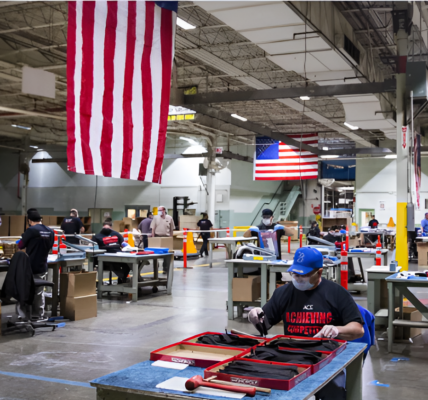
Andy Yen stands at a panoramic window in Proton’s headquarters in Switzerland, gazing at the gray clouds shrouding the Alps. Though the view isn’t clear today, Yen seems unbothered, choosing instead to point out the nearby wristwatch companies and dairy factory in this unassuming business park outside Geneva. It’s a strange location for a tech company, but as Yen puts it, “We have our reasons.”
Among those reasons is Switzerland’s strict privacy laws, providing a strong foundation for Proton’s mission to protect users’ communications from government surveillance. Additionally, Proton enjoys proximity to CERN, the world-renowned physics lab, where Yen recruits much of his talent.
Founded to provide encrypted communication tools to political dissidents and journalists, Proton’s flagship products, ProtonMail and ProtonVPN, have quietly become vital resources in protecting privacy worldwide. With users spanning across Russia, Ukraine, and beyond, Proton’s tools provide a safeguard against government overreach and surveillance.
Building a Privacy-Focused Alternative
Proton’s encryption technology ensures that users’ emails, files, and internet activities remain private, even from Proton itself. This end-to-end encryption scrambles data in transit and while stored, meaning it can only be decoded by the intended recipient. While other major tech companies like Google and Apple provide encryption, they retain the ability to decrypt data, making Proton’s offering more secure.
ProtonVPN has gained popularity in Russia, where it serves as a tool for circumventing government censorship. The app became one of the most downloaded iOS VPNs in Russia following the invasion of Ukraine, with over 1 million downloads in just one month.
Unlike companies that profit by surveilling their users for ad revenue, Proton’s business model revolves around paid subscriptions. “Our model is different,” says Yen. “We’re serving users, not advertisers.” This approach has proven successful, with Proton growing from 100 employees at the start of the COVID-19 pandemic to over 400 today. Yen expects the company to double its workforce in the next two years.
Competing with Big Tech
In recent years, Proton has expanded its product suite, releasing ProtonDrive and ProtonCalendar—secure alternatives to Google Drive and Apple’s iCloud. While both tech giants offer encryption, they maintain the ability to decrypt users’ data. Proton, on the other hand, keeps user data entirely encrypted, setting itself apart in an increasingly privacy-conscious market.
Yen has become a vocal critic of Big Tech’s dominance, which he believes has stifled competition and compromised user privacy. Proton has publicly supported draft antitrust bills in the U.S. that would prevent Apple and Google from prioritizing their own services over competitors. These bills, Yen hopes, will help level the playing field, forcing tech giants to improve their privacy offerings.
“For many years, surveillance capitalism was seen as the only way to build a profitable tech company,” Yen explains. “But we’ve shown that there is another way.”
A Career Shaped by Privacy Concerns
Yen’s journey to becoming a tech CEO was not intentional. Born in Taiwan, he earned a PhD in particle physics from Harvard and joined CERN, where he worked alongside the pioneers of the World Wide Web. Yen’s shift from physics to tech came after the 2013 revelations by whistleblower Edward Snowden, which exposed the extent of mass surveillance by the U.S. National Security Agency.
“I realized that the internet had evolved into something very different from the free and open system it was meant to be,” Yen recalls. “Governments and tech giants controlled the flow of information and privacy was disappearing.” This realization led him to create Proton, with the goal of restoring privacy to the internet.
ProtonMail launched in 2014 and quickly gained traction, crashing its servers due to overwhelming demand. The company raised $550,000 in crowdfunding, avoiding the need for external investors and maintaining employee ownership. This allowed Proton to stay true to its mission without compromising its principles.
Facing Challenges
Despite its success, Proton has faced challenges, including criticism for complying with a legal request from French authorities in 2020. The company handed over data about a user’s IP address, though the encrypted messages themselves remained secure. This incident sparked backlash, with some questioning Proton’s commitment to privacy. Yen defended the decision, explaining that Proton, while based in Switzerland with strict privacy protections, still had to comply with Swiss law.
Looking back, Yen believes the incident ultimately helped demonstrate how Proton’s encryption technology remains unbreakable. “We couldn’t provide authorities with any message content, only the user’s IP address,” he says. “If the user had used a VPN, even that data would have been protected.”
The Road Ahead
While Proton’s services may lack the convenience and features of Google and Apple’s offerings, Yen believes the privacy-focused alternatives will continue to gain traction as more users recognize the importance of protecting their data.
“The more convenient we make it, the more people will make the switch,” he says.
Proton’s work extends beyond product development. The company’s advocacy for antitrust reform is a crucial part of its broader mission to shift the tech industry’s focus away from surveillance capitalism and towards user privacy. While legislative progress may be slow, Proton’s commitment to its vision remains steadfast.
Many of Proton’s new hires come from Big Tech, seeking to work for a company that prioritizes privacy and democracy over profit. Yen sums it up succinctly: “Employees face a choice—do you want to work for a company that sells ads or for one that defends democracy in the 21st century?”





